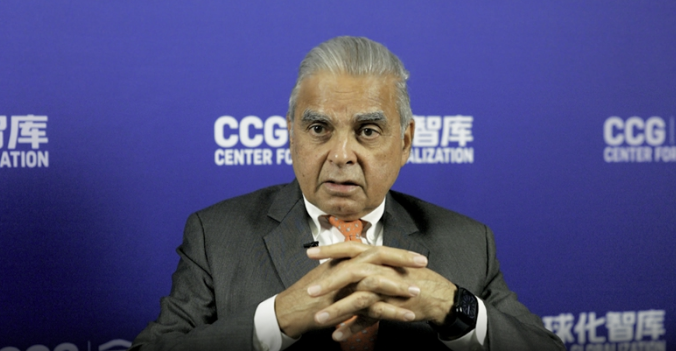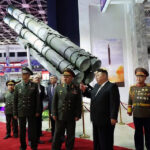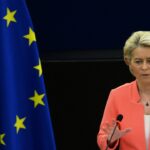Editor’s Note:
In his book, The Asian 21st Century, Kishore Mahbubani (Mahbubani), a former diplomat who served as Singapore’s permanent representative to the United Nations and president of the UN Security Council, pointed out the biggest thing happening in the world yet no Western media would talk about it – the arrival of the Asian century. In an exclusive interview with Global Times (GT) reporters Li Aixin, Qian Jiayin and Yu Jincui, Mahbubani shared his insights on why he believes the American century is over, the Asian century is coming, and how the US has focused on the wrong “battlefields,” at the book release hosted by Beijing-based think tank CCG. The China-US contest will not be in military dimension; it will be in economic dimension, Mahbubani said.
GT: In the book The Asian 21st Century, you pointed out that we will see the end of the era of Western domination and the Asian renaissance. What impact will the emergence of the Asia Century bring to the world geopolitical game? And will the impact, in turn, affect the Asian renaissance?
Mahbubani: There is an interesting story about this book, The Asian 21st Century. When it came out as an open-access book in English language in January 2022, the publisher expected only 20,000 downloads of the book. Instead, now there have been over 3 million downloads in 160 countries. So you can see the big gap between 20,000 and 3 million.
Why have there been 3 million downloads of the book? The simple answer is that most people around the world understand that this 21st century will be the Asian century. But they find that they cannot get information on it, because the Western media refuses to accept the fact that the 21st century will be the Asian century. So they always keep telling you stories – why Asia is failing; why China’s economic growth is over; why the Asians will keep fighting each other. They’ll only give you negative stories about Asia without trying to explain why it is that the fastest growing economies in the world over the last 20-30 years have been in Asia; how it is that in the year 2000, the US Gross National Product (GNP) was in nominal market terms eight times bigger than China’s, but now it’s only around 1.5 times bigger and China’s economy could become larger than that of the US. Even the ASEAN countries have done very well. In the year 2000, Japan’s economy was eight times the size of ASEAN economies. But by last year, it’s only 1.5 times larger, and ASEAN could become bigger than Japan.
These are examples of how there’s a phenomenal growth taking place in Asia. I think this will continue. The good news is that the countries in the Global South understand this, Africans understand this, the Latin Americans understand this. To some extent, some Europeans understand it. I think France and Germany understand it.
There is resistance in the US. The US would like to believe that the 20th century was the American century, the 21st century should also be the American century, but that’s very unrealistic, because the 20th century was exceptional.
In 1950, US GNP was almost 50 percent of the world’s GNP, now it is closer to 20 percent. The American century is over, and the Asian century is coming.
GT: We are witnessing that when the US resists the idea, it also carries out practical measures of containment against China. Will these measures work?
Mahbubani: It’s good that you use the word containment, because what’s interesting is that in the Cold War, the US openly declared that it was carrying out a policy of containment of the Soviet Union.
Now, in the case of the US-China contest, the US government denies that it is carrying out a containment policy of China. But what is interesting is that influential commentators, like Edward Luce of the Financial Times, Fareed Zakaria of CNN, have said this is a containment policy. When you try to cut off trade ties with China, that’s containment. When you try to stop a supply of chips to China, that’s containment.
Containment policy is real. The only question is whether it can work. I will make a prediction confidently that the containment policy will fail, because China has already integrated itself with the world, more than the US has. More countries do trade with China than they do with the US. The Cold War is the opposite, more countries traded with the US than they did with Soviet Union.
Because of that, if the US tries to contain China, instead of the US isolating China, US will find itself isolated from the rest of the world. And as a friend of the US, I tell them that’s not wise, don’t do it, take a wiser approach.
GT: You raised a new version of the CIA – China, India and ASEAN, as the next growth engine of world economy. And you are quite optimistic about India’s global leadership in the future. Do you think the US will accept the rise of India?
Mahbubani: I’m definitely optimistic for the new CIA, which stands for China, India and ASEAN, which I think will be the fastest growing economies over the next decade or so.
You are right that the US is trying to woo India very strongly. That’s a natural thing that the US is trying to do. In the Cold War, Henry Kissinger came to Beijing in 1971 to try and get China to support the US in the contest against the Soviet Union. Just as what Henry Kissinger did in 1971, Joe Biden is trying to do in 2023.
But I think in India is too big a country to become an ally of the US. India wants to emerge as an independent pole in a multipolar world. That will be good for the world and good for Asia. And I think that’s why I do not see an alliance developing between the US and India. They are cooperating in many areas. But I don’t see an alliance relationship between the two.
GT: You suggested that if Biden was smart, he should pretend to be harsh on China on the surface but in reality try to seek cooperation. What we are witnessing now seems to be the opposite. The US says it is not seeking a new Cold War. But moves of containment, de-coupling, and de-risking are increasing. What do you think is the main reason for this?
Mahbubani: I think the main reason for this contest is the iron law of geopolitics, which is about 2,000 years old – whenever the world’s No.1 emerging power, which today is China, is about to overtake the world’s No.1 power, which today is the US, the world’s No.1 power will always push down the world’s No.2 emerging power. This is an iron law of geopolitics.
That’s the reason why you will see this contest carry on. But at the same time, the US will keep on trying until it comes to a point and realizes they cannot stop China. When it realizes they cannot stop China, then it hopefully will listen to my advice and adopt a wiser policy of trying to integrate China in the global order that China and the US can build together.
GT: With increasing high-level contacts between China and the US, and gradual resumption of people-to-people exchanges, what is your prediction for the outlook on the China-US relationship in the near future?
Mahbubani: It’s actually good news if the Biden administration tries to have both cooperation and competition. Because there are some voices in the US, the more extreme voices, just want pure competition and not cooperation.
I think the Biden administration was initially under the impression that many countries in the world would rush to support the US in their efforts to contain or isolate China. But they have found that very few countries in the world, even some of their closest allies, are enthusiastic about trying to contain China. So it has taken two years for the Biden administration to understand that the world is not joining them.
I think this is also one reason why the Biden administration has become, in some ways, less confrontational toward China and is now willing to engage in discussions with China again. But even as it engages in discussions with China, the Biden administration also knows that there’s a very strong anti-China consensus in the American body politic, in Congress, in the Pentagon, and, frankly, in public opinion.
So that’s why the Biden administration cannot afford to be seen as weak on China. From time to time, they have to come up with strong, hostile statements just to pacify their domestic audience, which is why I say that it is better for President Biden to keep talking tough on China to protect himself domestically but continue functionally to cooperate with China.
GT: Are you optimistic about a return of rational voices in US political circle and public opinion in the future?
Mahbubani: I think the US has one of the most dynamic, open political systems in the world. It is always changing. At one stage, the pendulum was swinging toward more and more anti-China sentiment. But now I think more and more intelligent, thoughtful, rational people in the US are beginning to understand what I tried to say in my book, Has China won, that this isn’t going to work, as they say, in America, that no one’s going to join the US in isolating China. Therefore, it’s better for the US to, in some ways, work with the rest of the world to find different ways of working with China.
I think that the pendulum may swing, but it won’t swing all the way to the point where there will be the end of competition between the US and China; the competition will continue. But if it’s balanced with enough cooperation, then it’s not too bad an outcome. That’s the most realistic outcome you can get.
GT: In the book, you quoted an old strategic adage – in any great war, one should focus on the main battlefield and not get distracted by secondary issues. What do you think the “main battlefields” of China and the US are today?
Mahbubani: I think the main contest between the US and China will play out in the economic arena. At the end of the day, the winner will be seen to be the country with a bigger economy. That’s why it’s a huge mistake for the US to spend so much time boosting its military presence in East Asia, because the contest will not be in military dimension; it will be in economic dimension.
When the US made the bad decision to withdraw from the TPP at a time when China had joined the Regional Comprehensive Economic Partnership, the US sadly didn’t understand that the name of the game is economics and trade. By not participating in these trade agreements across the Pacific, the US was actually giving China an advantage in the main economic contest, and that’s very unwise for the US to do so.













